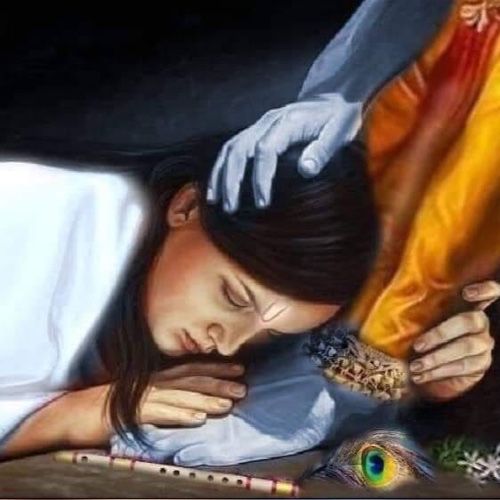Bhagwat Session 28
Shrimad Bhagavata Mahapurana
Synopsis of the Twenty-Eight Session (Prthu Story continued)
Bhagavata Chaturth Skanda (Book Four)
Chapter 20 and 21
—————————————————-
In the 27 th session we heard the story of Prthu and Archi. We made an attempt to decode the underlying message. However, sometimes it is essential to read word by word what is being said in the ‘Granth - Scripture’, as the narration can not cover each and every pearl of wisdom.
Pearls of Wisdom
Have been divided into four parts;
- Lord talks when he Manifests himself in the sacrificial hall of King Prthu
- Indra and Prthu bond
- Prthu talks when the Lord offered him a boon
- King Prthu teachings to his subject and the prerequisites to understand his teaching
The Lord Said;
1. The pious souls in this world, who are possessed of good understanding and are the best among men bear no ill will agains there fellow being, as they know that the body is not theirs ‘Self’.
2. The people who render service to the elders (meaning by wisdom and not age) have a blessing and do not get bewildered by ‘Maya’.
3. The awakened souls know that body to be a product of ignorance, desire and action and never get attached to it.
4. When there is non attachment to the body, the wise man does not have a feeling of ‘Mine-ness’ with regard to the house,
5. progeny or wealth, produced by that body.
6. The mind of the man who daily worships Me with reverence (in all his duties) expecting nothing from me, is purified.
7. He whose mind is purified dissociates himself with the world of matter and attaining true wisdom, enjoys eternal peace which is the same as my equipoised state and is also knows as the Brahma (The Absolute) and attains blessedness.
8. Ruler - Protection of the people is essential for the ruler, there by he gets one-sixth of the merit earned by the people and if he fails he incurs sins.
9. Ruler - He has to follow the sacred duties approved by the Brahmanas and enjoined by traditions, be unattached to them and rule with righteousness.
10. I (Lord) am not easily accessible through sacrificial performance or austerities or even yoga (concentration of mind), dwelling as I do in the heart of the ‘Even-Minded’.
Note:
1. Horse Sacrifice - Animal sacrifices were prevalent. When an animal was brought for sacrifice, it was promised that he would get a higher birth, which will enable them to cross the ocean of mundane existence. If not, the person who was sacrificing it, would offer himself as a sacrifice. Such was the strength, that the ‘Demi Gods’ themselves came down to take the offering of the sacrifice. (When this connection and power was lost, sacrifices were stopped gradually)
2. Brahmanas - Nobody is a Brahmin by birth, the one who knows ‘Brahman-That divine bliss’ is a Brahmin. (Gita pages sent)
3. Self - Is the one without a change, pure, self-effulgent, beyond the three Gunas, the substratum of the divine attribute, all pervading, unveiled, the witness of all, having no other soul and distinct from the body
4. Equipoised state, Even-Minded Stith Pragna - Enlighted souls who never give way to the morbid feelings of joy and grief, when the meet with affluent and adverse circumstances. They view the exalted, the middling and the vile alike and are balanced in joy and sorrow. Have conquered the world of dualities, the senses and he mind.
King Prthu and Indra
Lord Vishnu himself brings Indra to Prthu and Indra is about to touch the feet of Prthu as an apology for his offence of disrupting the Yagna.
Note:
Prthu did not let Indra touch his feet instead embraced him. Indra (Indriyas) should never be suppressed. When one sublimates, there is no need to suppress.
In other words, sublimate means reach for the higher, the lower tendencies will drop on its own. Reach for the Lord, the Mind (maan, budhi, chitha, ahenkar.. whatever we intent to call it) and the Indriyas will start to support us, and stop pulling us down or revolting.
King Prthu talk to the Lord
He asks for a boon of 10 000 Ears;
1. To enable him to drink to his hearts content the nectar like praises of the Lord. How can one be satisfied by hearing these only ones, with only two ears.
2. He even refuses ‘Moksha’ where he would merge and says would rather sit with these in the company of the exalted souls, where Shri Hari’s glory are sung by them from the core of their hearts.
3. These wise souls even after realising the self and attaining wisdom worship you alone, who dispel the delusion caused in the mind of your devotees. They have no other purpose than the constant remembrance of your feet.
4. A boon is a way to push one away from you and get trapped in maya. Hence, as a father does what is good for his child his own accord, without being asked by the child, you too should likewise strive for our good. (This right to tell God, comes only with total surrender)
5. The Lord blesses him with ‘Devotion’. As the Lord said, he has developed a mental attitude towards God, though which one is able to overcome Maya.
Note:
King Prthu asks for 10 000 ears, where keeping only 2 ears engaged in Hari is so difficult.
The world does not enter and reach us through any other as it does thought our ears. Hence, these ears should be ever kept busy and full listening to the glories of the Lord, so that we are able to imbibe his virtues.
King Prthu teachings to his Subject
King Prthu by his talk tells us the duty of the King does not only consist of providing the martial benefits, but also leading his citizens towards Divinity.
He also said that the prerequisite to under Dharma are;
1. The people who want to understand Dharma have to submit their own conceptions about it to the wise. No matter how much one tries, a vessels which is full or kept upside down, can not be filled with fresh water. To let the fresh water in, one has to first spill the stale water out and put he vessel in a position to receive.
2. One has to surrender and fix ones mind on God, who is above sense perceptions. He says, in the opinion of believing souls there is a God and is seen in cases. One has to postulate his existence. One has to walk in faith.
3. One has to be free from The Carping Spirit- Carping spirit, is basically to find fault with others and see no good in anyone or anything.
The Carping Spirit - Quoted from Ananda Blog
I was chatting recently with a gentleman about my regard for someone who seemed to be a good man and well intentioned. My acquaintance remarked, “Yes, I agree, but …..” before proceeding to air his grievances about this person, pointing out one perceived fault after another. I reflected on why my critic friend felt such a need to counter my innocuous, positive comment, with which he agreed, with his own list of negatives.
It’s a common habit. The mind, ever discontent, looks for, finds, and dwells upon imperfections. “It’s a beautiful day, but….” “That was a great meal, but……” “She’s a noble person, but…..”
“I’m just being trying to see all sides,” some offer as an excuse but is this really true? More importantly, is it helpful to habitually look for imperfections? Why must praise or compliments be tempered by perceived faults?
When a friend proudly invites you to visit his new home, do you make an inspection of the closets to find flaws? Of course not; you say, “Congratulations” and offer a compliment.
Incessant disgruntlement or feeling a need to “balance” positive observations with negative ones is a mental disease that feeds discontent and subtly attracts to us the very things we dislike. How could they not come if we are constantly on the lookout for them?
Far from “seeing all sides,” we find ourselves exploring problems to such an extent that intuitive perception of higher, more expansive solutions to those same problems becomes impossible.
Those infected with the carping spirit close doors to spiritual counsel or guidance from others or from the world around them.
——————————————————
"We can't drive out darkness with a stick, with a stick. We need light, we need light.."
Let's uplift ourself from the low to the higher level of consciousness. Let's change our view and focus on the joy and good.
🌷”My love for God so consumes me, that there is no place in my heart to hate anyone."🌷
Jai Shri Krishna 🙏
Jai Hanuman 🙏


